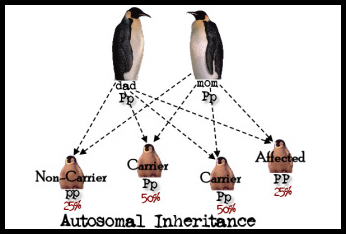Glycoprotein Storage Diseases are autosomal recessive conditions, meaning that a defective trait or mutation passed on from both parents is required for the disease to be expressed. Every person carries two copies of a gene, one of which they pass on to their offspring (the other provided by the second parent). In many cases, we all have a mutation or defect in some of our genes, but do not show signs of the defect because the other gene is able to allow us to function “normally.” In autosomal recessive diseases, the condition occurs when both copies of a gene are defective.
Since each parent donates a single gene copy to each offspring, there are four possible inheritance patterns for diseases to occur, as illustrated below.

Since most people can live apparently normal lives with one healthy half of a gene pair, recessive gene disorders are relatively rare. However, as shown above, 50% of people inheriting an unexpressed, or recessive, gene defect are known as carriers. Carriers have the ability to continue a family’s mutation to the next generation. Over time, though, the mutation will become diluted unless a carrier mates with another carrier.
Two carrier parents have a 25% chance of giving birth to a child with an autosomal recessive disease. Because these odds occur for each pregnancy, it is possible, though not likely, that a family may have more than one child with a genetic disease. There is a greater likelihood, 50%, that offspring of two such parents will be a carrier and continue to pass on the defect to future generations. Lastly, a 25% chance exists that a child born to two carrier parents will be completely healthy. Such a child inherits two good gene copies and, thus, will not pass the gene defect to its heirs.
For couples who have a known history of the same recessive genetic disease in their families, carrier testing is a possibility to assist with family planning. However, testing for a genetic defect without such prior knowledge or history is not possible or recommended for most autosomal recessive diseases.
